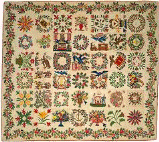Textile Society of America

Textile Society of America: Symposium Proceedings
Date of this Version
2010
Document Type
Article
Abstract
After the formation of the reservation in 1868, the government issued licenses to regulate trade in wool, textiles, and pelts that traders acquired from Navajos. In 1890, blanket sales were 10% of wool sales; by 1930, weavers processed one-third of the clip, their textiles were valued at $1 million, and provided one-third of reservation income. Only Navajos raised hardy coarse-wooled churros whose wool is ideal for hand processing. Recently analyzed archival evidence reveals that blankets were transformed into rugs when tariff removal (1894-97) triggered imports of one billion pounds of duty-free wool, much of it from China. Thus Navajos underwent a unique kind of structural adjustment not experienced by other American growers subject to tariff protection for clothing wools after 1898. Government officials viewed weaving as an extension of the livestock industry; haphazard attempts to “breed up” Navajo flocks compromised wool quality for hand weavers and textile manufacturers. For decades weavers’ productivity provided a secure means of diversification as traders marketed wool in the form of rugs to cope with volatile fluctuations in the global wool markets. Evidence confirming the consequences of free trade is contained in correspondence among eastern wool brokers and southwest wholesalers, government officials and reservation traders. Their business records reveal that nearly all weaving was marketed by weight until the 1960s, with weavers receiving three to six times current wool values. Today these “pound” blankets, and knock-offs bearing Navajo designs, sell avidly on the Internet, diminishing the demand for textiles woven by thousands of weavers who lack a reservation-wide infrastructure to market their work.


Comments
Presented at “Textiles and Settlement: From Plains Space to Cyber Space,” Textile Society of America 12th Biennial Symposium, Lincoln, Nebraska, October 6-9, 2010. Copyright 2010 Textile Society of America.